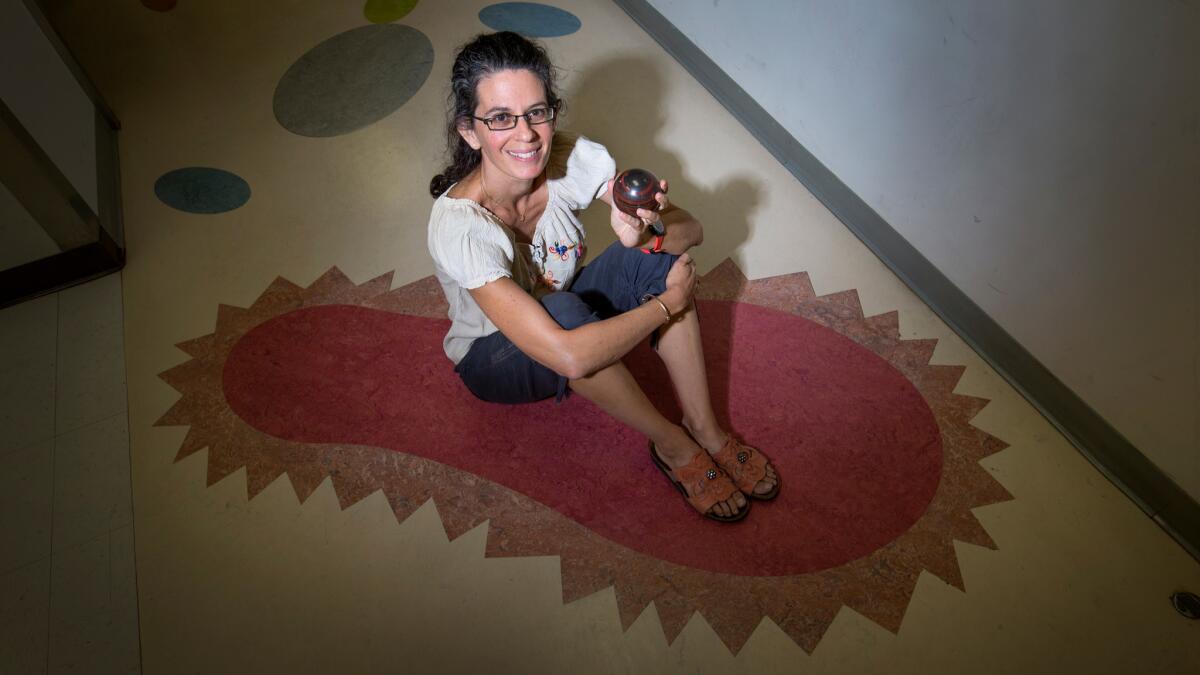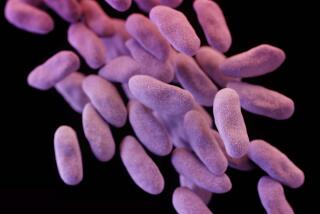Bacteria have sculpted the world we live in, and that’s why MacArthur winner Dianne Newman studies them

- Share via
Newly minted MacArthur fellow Dianne Newman is a huge fan of tiny microbes.
Sit down with her in her homey office at the Caltech campus in Pasadena, and the 44-year-old microbiologist will dazzle you with amazing tales of these miniature organisms.
She might mention that there are so many microbes on our planet that if you lined them up end to end, they would form a chain that could stretch to the sun and back 200 trillion times.
Or perhaps she’d rhapsodize about some of her favorite microbes, like Rhodopseudomonas palustris, a hot pink bacterium that eats dissolved iron and produces rust, or Pseudomonas aeruginosa, which generates pigments in almost every color.
“They are so much more interesting than we are,” Newman said. “We basically have two ways of making energy. These guys have evolved ways to grow under every conceivable habitable condition.”
The “genius” grant winner is particularly interested in microbes that make energy in the absence of oxygen.
This research has led her to study the early evolution of life on Earth and how different types of microbial activities are recorded in ancient rocks from a time, billions of years ago, when there was no oxygen in the atmosphere.
More recently, she has collaborated with colleagues at Children’s Hospital Los Angeles and Keck Hospital of USC to study how bacteria manage to survive in the lungs of patients with cystic fibrosis.

“Through her ability to bridge disparate disciplines and see the commonalities that underlie seemingly distinct processes, Newman is enriching our understanding of the impact of microorganisms from the early days of Earth’s history to human health today,” the MacArthur Foundation said in its award announcement.
Newman spoke with the Times about her research, the beauty of microbial chemistry, and how her family responded to the big news.
If I were sitting next to you on a plane and asked about your work, what would you say?
I study weird forms of microbial metabolism, particularly ones that occur in places devoid of oxygen.
Why is this important?
Microbes dominate the biosphere on Earth. They have impacted — and continue to impact — not only the physical environment, but the chemical and biological environment in really profound ways. For example, we owe all the oxygen in the atmosphere today to the biochemical invention of ancient microorganisms.
How is it that these tiny organisms have had such an outsized impact on Earth? Is it because there are so many of them?
It’s both a numbers thing and a talent thing. They are the best chemists on the planet.
It is also an age thing. They have been around for billions of years. The human species is minuscule on the geologic time scale in terms of the history of life. Microbes were the first in and they will be the last out.
We owe all the oxygen in the atmosphere today to the biochemical invention of ancient microorganisms.
— Dianne Newman
The microbial world is so vast and there is so much that’s unknown. How do you decide what questions to ask?
A few central questions unify everything we do in the lab. How do bacteria survive when times are tough? How do they generate energy when resources are scarce? How do they keep alive under times of stress? What does it mean to grow slowly? Is there a strategy they use when they are just hanging out that is fundamentally different from when they are growing quickly?
These are really basic questions, and yet the answers to these may inform our thinking about how to treat chronic infection.
How?
Chronic infections, such as those in the lungs of patients with cystic fibrosis, or on the feet of people with diabetes, or in burn wounds, are really hard to treat with conventional drugs because the bacteria grow so slowly. They may not have the energy to take up drugs, or the drugs’ targets are not relevant. We need to understand how those organisms are surviving in order to develop new techniques to combat them.
I’ve heard you describe the metabolic machinery of microbes as beautiful. What do you mean by that?
For me, what is beautiful about it is the chemistry — the ability to achieve a reaction that shouldn’t be possible under normal conditions and to do it in a way that is sustainable and efficient. Today we have many talented chemists trying to find synthetic ways of doing some of the same things, and they gain inspiration and insight from nature’s strategies.
Your lab is engaged in two very different types of research — the study of microbial life in Earth’s early days and chronic infections in the lungs of people with cystic fibrosis. How are these related?
In both cases we are studying how bacteria survive and thrive without using oxygen.
When you get to the remote past, you don’t have fossils like big dinosaur bones. You have a few microscopic fossils, but mostly you have a molecular record. So a molecular and cell biological approach is really necessary to interpret what these molecules mean for energy production before there was oxygen in the Earth’s atmosphere. It allows you to look for new ways to interpret ancient traces of life on the young planet.
In a more contemporary context, we are also trying to understand how microbes are able to survive in places that you might not intuitively think about as being anaerobic, but nonetheless have very limited oxygen — like certain infections in the lungs of patients with cystic fibrosis. It happens to be the human lung, but I see it as just another environment.
By understanding how pathogens survive in these conditions you can begin to identify potential new targets for drug development that would be relevant and different than the ones conventional antibiotics go after.
How did your family respond to the news that you got this award?
Frankly, my son once told me I won the Nobel Prize award as his mom, and that meant more to me than any other prize I might win.
This is a great honor, but it doesn’t change who I am. My family is proud and happy, but they know what an idiot I am in real life.
This interview has been edited for length and clarity.
Do you love science? I do! Follow me @DeborahNetburn and “like” Los Angeles Times Science & Health on Facebook.
MORE IN SCIENCE
MacArthur winner Victoria Orphan showed how deep-sea microbes keep greenhouse gas out of atmosphere
Manu Prakash, newly minted MacArthur ‘genius,’ builds water computers and origami microscopes
MacArthur Fellow Jin-Quan Yu breaks some of nature’s strongest bonds to synthesize new molecules







